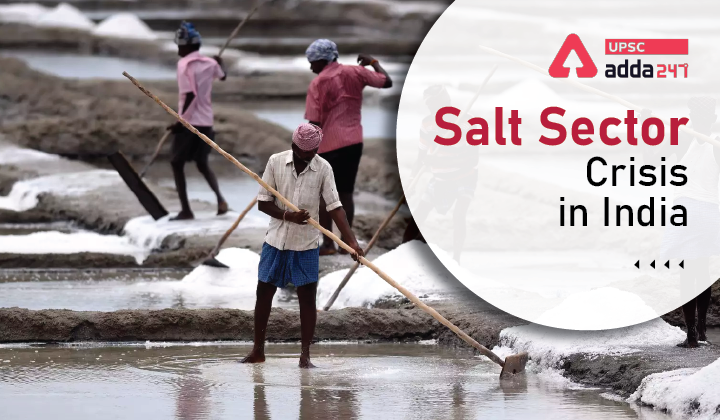Table of Contents
Salt sector UPSC: Relevance
- GS 2: Government policies and interventions for development in various sectors and issues arising out of their design and implementation.
Salt sector crisis: Context
- Salt industry in India is facing huge challenges in meeting the demand and in tackling the realisation crisis faced by salt farmers.
Salt cultivation in India: Key points
- In India, about five lakh people work in the salt industry directly and indirectly.
- At the moment, a farmer earns about ₹250 to ₹300 for a tonne of salt he or she produces. The prices, however, keep fluctuating.
Salt production in India
- India is the world’s third largest producer of salt.
- Gujarat produces more than 80% of the country’s total salt production.
- At the initial years, farmers were getting ₹ 17/per tonne which touched up to ₹70 by 1991.
- 5% salt is produced either from the sea water or from the sub soil water and the entire process is done by seeding, cultivation and harvest. Only 0.5% salt is produced by mining (Mandi in Himachal Pradesh).
- Sal industry is a seasonal industry and it should be considered as agriculture
https://www.adda247.com/upsc-exam/salt-sector-crisis-in-india-hindi/
Issues of salt industry in India
- Low price to farmers: Farmers is facing low price for salt production as there is no minimum support price.
- Issue with salt workers: Workers are also in distress due to a lack of proper system for wages and social security.
- Small salt belts: There are about 12,800 salt processing units in Gujarat’s coastal belt, out of which only 119 are considered as medium and large.
- Least attention from the government: Salt, being the cheapest commodity, is getting the least attention from the government.
- Irrelevant laws: All the laws pertaining to the industries are applicable to salt production even though the production is done through simple solar evaporation just because it is listed as mining industry.
- Rising demand: As of now, demand and supply are almost same. The demand, however, is rising at the rate of 8% and the production increase is just 3%.
- Hydro power projects: Projects such as the Ran Sarovar, a project to build a fresh water lake in 5,000 square kilometres of this area, would make about 50,000 people jobless.
- Companies replacing cooperatives: Initially salt production was in the hands of cooperatives. It, however, is being replaced by big companies who are deciding the wages of these workers and production of farmers. These workers, as of now, do not have minimum wages or social security.
Recommendations for salt industry
- Create a nodal agency: Salt is a Central subject and land is a State subject. A body need to be constituted to set up common rules and regulations for the salt farmers.
- National salt policy: A new salt policy should be formulated for the entire country to fix the responsibility on governments and manufactures.
- Access to important services: To keep the farming alive, farmers must be given the access to the technology to make the final by-product of their effort. They must get crop insurance and minimum support price.
Read current affairs for UPSC





 TSPSC Group 1 Question Paper 2024, Downl...
TSPSC Group 1 Question Paper 2024, Downl...
 TSPSC Group 1 Answer key 2024 Out, Downl...
TSPSC Group 1 Answer key 2024 Out, Downl...
 UPSC Prelims 2024 Question Paper, Downlo...
UPSC Prelims 2024 Question Paper, Downlo...





